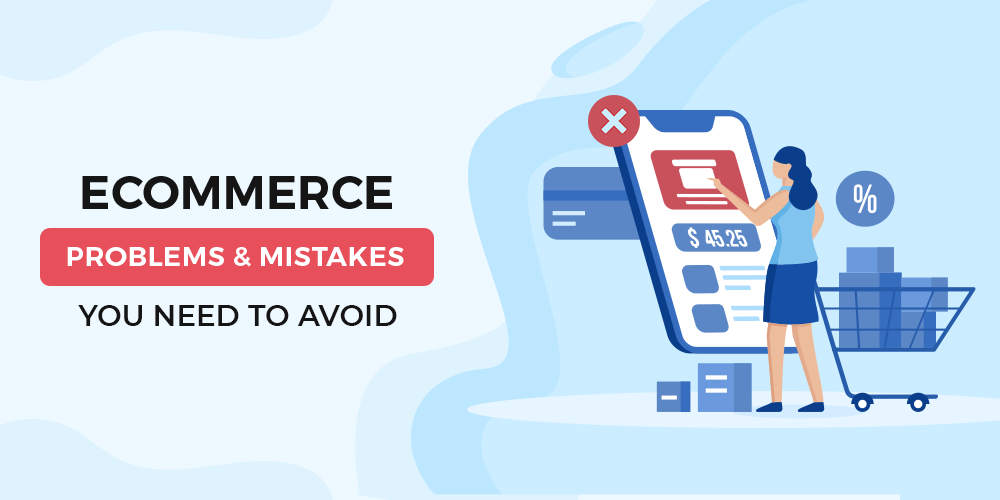The Top 5 Mistakes eCommerce Businesses Make and How to Avoid Them
eCommerce businesses confront a variety of obstacles in the fast-paced world of online retail that have the power to make or break their success. The digital landscape presents countless potential, but it also has traps that many firms are susceptible to. Here are the top five mistakes that eCommerce companies should avoid making, along with solutions.
1. Choosing the Wrong Platform
The success of your online store depends on your choice of eCommerce platform. Selecting a platform that is incompatible with your company’s requirements or expansion goals is a typical error. While some platforms could lack necessary features, others might be overly complicated.
How to Avoid This Mistake:
- Assess Your Needs: Evaluate your business size, target market, and specific requirements. Consider scalability, ease of use, and the available features.
- Research Thoroughly: Compare different platforms like Shopify, WooCommerce, Magento, and BigCommerce. Read reviews, request demos, and consider consulting with an eCommerce marketing agency to get expert advice.
2. Not Investing in Marketing
The lifeline of any eCommerce company is marketing. Regretfully, a lot of companies undervalue the need of having a strong marketing plan. Even the best items may go unnoticed if marketing budgets are not allocated.
How to Avoid This Mistake:
- Develop a Marketing Plan: Create a comprehensive marketing strategy that includes SEO, content marketing, social media, email campaigns, and paid advertising.
- Allocate a Budget: Set aside a specific budget for marketing efforts. Investing in professional services, such as an eCommerce marketing agency, can significantly boost your online visibility and sales.
3. Poor Website Design and User Experience
A website that is hard to use, takes a long time to load, or is not visually appealing may turn off visitors. One of the most important factors in turning visitors into customers is user experience, or UX.
How to Avoid This Mistake:
- Optimize for Speed: Ensure your website loads quickly by optimizing images, leveraging browser caching, and using a reliable hosting provider.
- Focus on UX Design: Create an intuitive and seamless user experience. Use clear calls-to-action, simplify the checkout process, and make sure your website is mobile-friendly.
- A/B Testing: Regularly conduct A/B tests to understand what design and UX elements work best for your audience.
4. Ignoring Customer Service
Although it’s frequently disregarded, customer service in eCommerce is crucial to retaining and satisfying customers. Negative customer service can result in lost sales and bad reviews.
How to Avoid This Mistake:
- Implement Live Chat: Offer real-time support to your customers through live chat. It helps resolve issues quickly and enhances customer satisfaction.
- Provide Clear Contact Options: Make it easy for customers to reach you through multiple channels like email, phone, and social media.
- Train Your Team: Ensure your customer service team is well-trained, knowledgeable, and equipped to handle various customer queries and complaints effectively.
5. Neglecting Analytics and Data
Many eCommerce businesses don’t use data analytics to guide their choices. Neglecting data implies losing out on important information about sales patterns, consumer behavior, and the efficacy of marketing.
How to Avoid This Mistake:
- Use Analytics Tools: Utilize tools like Google Analytics, Shopify Analytics, and other eCommerce platforms’ built-in analytics to track your performance.
- Monitor Key Metrics: Keep an eye on important metrics such as conversion rates, average order value, customer acquisition cost, and customer lifetime value.
- Data-Driven Decisions: Base your business decisions on data insights. Regularly review and analyze your data to identify areas for improvement and opportunities for growth.
Charting Your Course to eCommerce Success
You can put your eCommerce business on the road to success by avoiding these typical blunders. You may build a successful online store by selecting the best platform, making marketing investments, focusing on customer service, optimizing website design and user experience, and utilizing analytics. Recall that enlisting the help of an eCommerce marketing agency may give you the support and strategic direction you need to successfully negotiate the intricacies of the online market.

